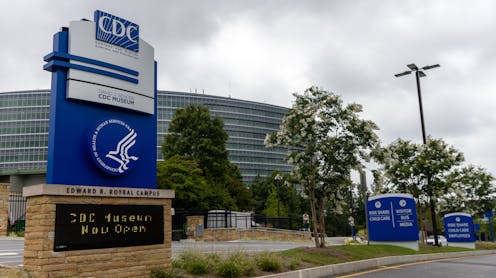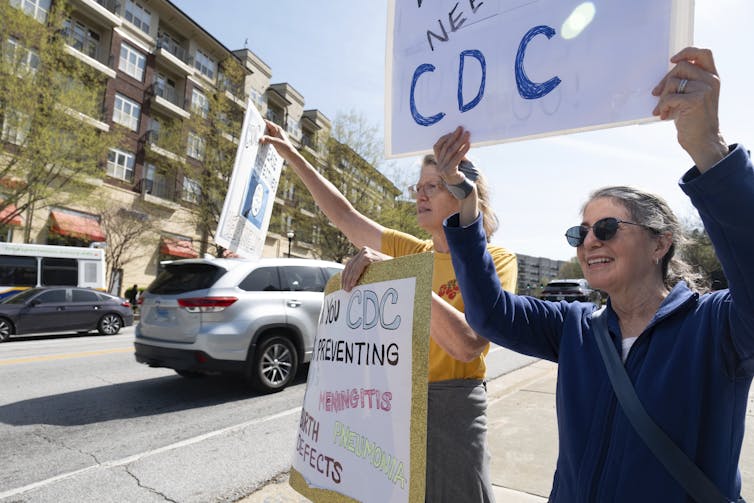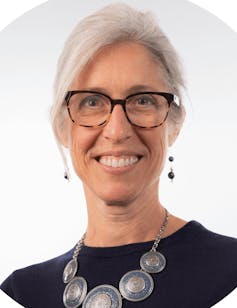Susan Monarez, Trump’s nominee for CDC director, faces an unprecedented and tumultuous era at the agency
- Written by Jordan Miller, Teaching Professor of Public Health, Arizona State University
 The Trump administration laid off thousands more employees at the CDC on April 1, 2025, as part of its workforce reduction.Anadolu/Getty Images
The Trump administration laid off thousands more employees at the CDC on April 1, 2025, as part of its workforce reduction.Anadolu/Getty ImagesThe job of director of the Centers for Disease Control and Prevention carries immense responsibility for shaping health policies, responding to crises and maintaining trust in public health institutions.
Since the Trump administration took office in January 2025, the position has been held on an interim basis by Susan Monarez, whom Trump has now nominated to take the job permanently after his first nominee, former Florida Congressman David Weldon, was withdrawn, in part over his anti-vaccine views.
Monarez, in contrast, is a respected scientist who endorses vaccines and has robust research experience. While she is new to the CDC, she is an accomplished public servant, having worked in several other agencies over the course of her career.
Monarez’s nomination comes at a time when the Department of Health and Human Services is in the midst of mass layoffs, and health professionals – and many in the public – have lost confidence in the federal government’s commitment to supporting evidence-based public health and medicine.
After having already cut nearly 10% of the CDC’s employees earlier in the year, the White House laid off thousands more HHS employees on April 1, gutting the CDC’s workforce by more than 24% in total.
As a teaching professor and public health educator, I appreciate the importance of evidence-based public health practice and the CDC director’s role in advancing public health science, disease surveillance and response and a host of other functions that are essential to public health.
The CDC is essential to promoting and protecting health in the U.S. and abroad, and the next director will shape its course in a challenging era.
A critical time for public health
In addition to the massive overhaul of the country’s public health infrastructure, the U.S. also faces a multistate measles outbreak and growing concerns over avian flu. Cuts to both the workforce and federal programs are hobbling measles outbreak response efforts and threatening the country’s ability to mitigate avian flu.
The Trump administration has also brought in several individuals who have long held anti-science views.
Robert F. Kennedy Jr.’s appointment to head of the Department of Health and Human Services was widely condemnedby health experts, given his lack of credentials and history of spreading health misinformation.
So the stakes are high for the CDC director, who will report directly to Kennedy.
 Two CDC workers – one who has been at the agency for 25 years and the other for 10 – protest mass layoffs on April 1, 2025.AP Photo/Ben Gray
Two CDC workers – one who has been at the agency for 25 years and the other for 10 – protest mass layoffs on April 1, 2025.AP Photo/Ben GrayAn abrupt pivot
Prior to his inauguration, Trump had signaled he would nominate Weldon, a physician who has promoted anti-vaccine theories.
But in March, Trump withdrew Weldon’s nomination less than an hour before his confirmation hearing was set to begin, after several Republicans in Congress relayed that they would not support his appointment.
Instead, Trump tapped Monarez for the top spot.
The role of a CDC director
The CDC relies on its director to provide scientific leadership, shape policy responses and guide the agency’s extensive workforce in addressing emerging health threats.
Prior to January, the CDC director was appointed directly by the president. The position did not require Senate confirmation, unlike the other HHS director positions. The selection was primarily an executive decision, although it was often influenced by political, public health and scientific considerations. But as of Jan. 20, changes approved in the 2022 omnibus budget require Senate confirmation for incoming CDC directors.
In the past, the appointed individual was typically a highly respected figure in public health, epidemiology or infectious disease, with experience leading large organizations, shaping policy and responding to public health emergencies. Public health policy experts expect that requiring Senate confirmation will enhance the esteem associated with the position and lend weight to the person who ultimately steps into the role. Yet, some have expressed concern that the position could become increasingly politicized.
Who is Susan Monarez?
Monarez holds a Ph.D. in microbiology and immunology. She has been serving as acting director of the CDC since being appointed to the interim position by Donald Trump on Jan. 24.
Prior to stepping into this role, she had been serving as deputy director for the Advanced Research Projects Agency for Health, or ARPA-H, since January 2023, a newer initiative established in 2022 through a US$1 billion appropriation from Congress to advance biomedical research.
Monarez has robust research experience, as well as administrative and leadership bona fides within the federal government. In the past, she has explored artificial intelligence and machine learning for population health. Her research has examined the intersection between technology and health and antimicrobial resistance, and she has led initiatives to expand access to behavioral and mental health care, reduce health disparities in maternal health, quell the opioid epidemic and improve biodefense and pandemic preparedness.
Monarez has not yet laid out her plans, but she will no doubt have a challenging role, balancing the interests of public health with political pressures.
Reactions to her nomination
Reactions to Monarez’s nomination among health professionals have been mostly positive. For instance, Georges Benjamin, executive director of the American Public Health Association, remarked that he appreciates that she is an active researcher who respects science.
But some have advocated for her to take a more active role in protecting public health from political attacks.
In her interim position, Monarez has not resisted Trump’s executive orders, even those that are widely seen by other health professionals as harmful to public health.
Since taking office, the current Trump administration has issued directives to remove important health-related data from government websites and has discouraged the use of certain terms in federally funded research.
Monarez has not pushed back on those directives, even though some of her own research includes key terms that would now be flagged in the current system, like “health equity”, and that health leaders expressed concerns in a letter sent to Monarez in January.
 One of the duties of Susan Monarez, the nominee to lead the CDC, is to communicate critical health information to the public.NIH/HHS/Public domain
One of the duties of Susan Monarez, the nominee to lead the CDC, is to communicate critical health information to the public.NIH/HHS/Public domainCDC staff have said that Monarez has not been visible as acting director. As of early April, she has not attended any all-hands meetings since she joined the CDC in January, nor has she held the advisory committee to the director meeting that is typically held every February. One agency higher-up described her as a “nonentity” in her role so far. Monarez has also reportedly been involved in decisions to drastically cut the CDC workforce.
While some have commented on the fact that she is the first nonphysician to head the agency in decades, that may actually be an advantage. The CDC’s primary functions are in scientific research and applying that research to improve public health. Doctoral scientists receive significantly more training in conducting research than medical doctors, whose training rightly prioritizes clinical practice, with many medical schools providing no training in research at all. Monarez’s qualifications are well-aligned with the requirements of the director role.
A time of change
The CDC was founded at a time of great change, in the aftermath of World War II.
Now, in 2025, the U.S. is again at a time of change, with the advent of powerful technologies that will affect public health in still unforeseeable ways. New and emerging infectious diseases, like measles, COVID-19 and Ebola, are sparking outbreaks that can spread quickly in population-dense cities.
A shifting health information ecosystem can spread health misinformation and disinformation rapidly. Political ideologies increasingly devalue health and science.
All these factors pose real threats to health in the U.S. and globally.
The next CDC director will undoubtedly play a key role in how these changes play out, both at home and abroad.
This story is part of a series of profiles of Cabinet and high-level administration positions.
Jordan Miller does not work for, consult, own shares in or receive funding from any company or organization that would benefit from this article, and has disclosed no relevant affiliations beyond their academic appointment.
Authors: Jordan Miller, Teaching Professor of Public Health, Arizona State University

